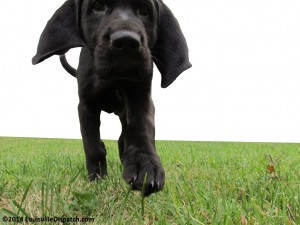Saturday April 27, 2024
 Since dogs and cats already have beautiful fur coats, it is easy to forget that they can suffer hypothermia, frost-bite, and other weather related injuries that people do. With the temperature dropping and lots of cold rain and/or snow already, it important to help your pet stay comfortable and safe throughout the winter season.
Since dogs and cats already have beautiful fur coats, it is easy to forget that they can suffer hypothermia, frost-bite, and other weather related injuries that people do. With the temperature dropping and lots of cold rain and/or snow already, it important to help your pet stay comfortable and safe throughout the winter season.
Here are some general tips to help you prepare for the coming cold weather:
- Puppies, kittens, and senior pets should not be left outside for any reason. Puppies and kittens are not fully developed and don’t have the ability to stand up to the colder temperatures yet. Senior pets are losing some of the natural defenses that they have and are more susceptible to the temperature as well.
- If you have outdoor cats, be cautious in starting your car. Many cats will climb under the hood of a car to stay warm. Knocking on your vehicle’s hood before you start it can let your pets know that it is time to vacate their hideout.
- Avoid shaving or cutting your pet’s hair short during the winter. If you don’t have a choice, consider purchasing a sweater for your pet. If you have a pet with short-hair and it appears to be sensitive to the cold, you may want to consider this as well.
- Anti-Freeze should be stored in a tightly closed container and kept away from pets. It is deadly.
- Wipe their feet off when they come inside. The salt or other de-icers used on your driveway or sidewalk can cause irritation to their paw pads.
- Keep your dog on a leash with a collar and ID tag at all times. The cold weather can mask a dog’s scent trail making it hard for them to find their way home if they get out.
- If you have an outside only pet – be sure their shelter is adequate. It is very important for the shelter to stay dry and draft free. Having a wet bed or wet fur will prevent your pet from regulating its body temperature. You should also make sure your pet has access to unfrozen water and you should increase their food intake.
- Keep your pet from chewing on your Christmas tree – both real and artificial. You should also think about what decorations are within reach of your pet. If you have a live tree, use a tree skirt to prevent your pet from drinking the water: some of the chemicals in the tree food are toxic. If you have a cat that likes to climb, be sure to anchor the tree so that it cannot topple over.
- Holly, poinsettias, mistletoe and many other common household plants are toxic to your pet. A list of some of the common toxic and non-toxic plants can be found on the ASPCA website.
These are just a few guidelines to help you ensure your pet’s safety during the winter months. More information can be found at the ASPCA, Pet WebMD, and PetSmart websites.
 Weather
Weather Traffic
Traffic @LouisvilleDispatch
@LouisvilleDispatch @LouisvilleDisp
@LouisvilleDisp Subscribe
Subscribe
Leave a Reply